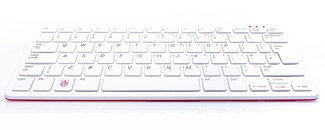Monday, November 2nd 2020
Raspberry Pi 400 Compact Keyboard Computer Announced for 70 USD
The Raspberry Pi Foundation have recently released the Raspberry Pi 400 keyboard computer based on the Raspberry Pi 4 and Raspberry Pi keyboard. The new computer is a modern take on the home computers of the 1980s such as the BBC Micro, ZX Spectrum, and Commodore Amiga with the computer being fully integrated within the keyboard. The computer features a custom layout Raspberry Pi 4 4 GB clocked at 1.8 GHz with the ability for significant overclocks thanks to the large integrated heatsink.
The new product is targeted towards cost-conscious consumers and students who require a basic computer. The computer is available in a number of different versions including English (UK and US), French, Italian, German, and Spanish keyboard layouts. The Raspberry Pi 400 is now available for 70 USD for the computer on its own, or 100 USD for a ready-to-go kit with power supply, mouse, SD card, HDMI cable, and official Raspberry Pi Beginner's Guide.Announcement Video
Source:
Raspberry Pi Foundation
The new product is targeted towards cost-conscious consumers and students who require a basic computer. The computer is available in a number of different versions including English (UK and US), French, Italian, German, and Spanish keyboard layouts. The Raspberry Pi 400 is now available for 70 USD for the computer on its own, or 100 USD for a ready-to-go kit with power supply, mouse, SD card, HDMI cable, and official Raspberry Pi Beginner's Guide.Announcement Video




20 Comments on Raspberry Pi 400 Compact Keyboard Computer Announced for 70 USD
But this would be cheaper and need a lot less software written to get that old fashioned feel I sometimes miss;).
They dropped the ball without having an optional internal 2.5inch drive bay.
Putting an internal usb port and leave space costs nothing. The SATA USB adapters take no space at all.
You can do even better workaround for USB3.0. Instead of using a cheap dual-port VLI controller they could've thrown an extra $1-$2 for µPD720201, which is a quad-port USB3.0 host controller, and in the spirit of AsRock electronic design methodology, just daisy-chain the shit out of it with things like SATA-III controllers etc.
Plus, everyone is already using USB3 on Pi just for storage, so losing one USB3 in favor of SATA is a reasonable tradeoff.
t's still a step in the right direction, but there's room for improvement. As far as it's not more expensive than various Rockchip alternatives, there's always a headroom in BOM for more features.Of course you can. Linux has a decent support for Class 2 USB Audio. In some cases it may require manual config tweaking, but most common DACs should work out of the box.
or if you prefer a PC example from the 90s
The proper way to do that would be to get a SoC which natively supports SATA/USB 3.0/Ethernet/PCIe.
But I guess that would increase the price by $20 so better have colorful packaging and generate e-waste instead.
And regarding SATA over USB, it's a vague argument. USB3 to SATA controllers aren't any less reliable than PCIe to SATA3 or any other IC, which you can find all over x86_64 desktop and embedded boards.
RaspberryPi Foundation definitely has some exclusive deal with Broadcom, which means we won't see any alternative chipsets any time soon. Plus, the OS/software development is already ironed out for BCM, and mass-market won't trade stable OS releases and good support for a beefier SoC, just to end up with some abandonware like NanoPi, OrangePi and CubieBoard and others. Same reason why Hardkernel barely budged off Exynos to Amlogic.